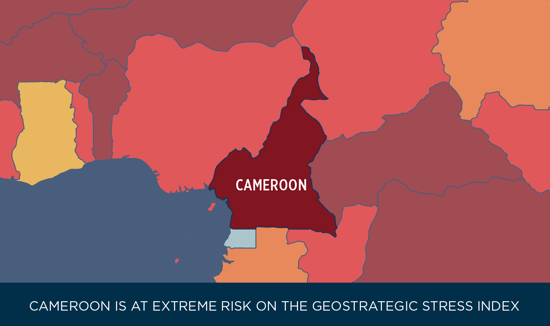The following analysis is part of Global Guardian's 2025 Global Risk Assessment and Geostrategic Stress Index (GSI), a predictive model that shows what countries are most likely to undergo a polycrisis in the next five years driven by geostrategic concerns. For more information, download and explore the 2025 Global Risk Map.
Current Situation
On 14 May 2024, five Cameroonian gendarmes were killed in an attack by English-speaking separatists in the country’s southwest province. Cameroon is an ethnically and religiously diverse country ruled by President Paul Biya since 1982. It has ongoing armed conflicts in its extreme north province with Boko Haram affiliates and in the northwest province with English-speaking Ambazonian separatists. Most of the country’s population is concentrated in these two conflict zones. Jihadist insurgencies like the one in northern Cameroon are also present in its neighboring states Chad, Niger, and Nigeria. In 2025, Cameroon will hold presidential elections that will test Paul Biya’s control. With no clear successor, Cameroon will likely face a succession crisis regardless of the election outcome.
History
Cameroon sits on the crossroads between central and west Africa, making it a critical membrane for the transmission of political and economic dynamics from one region to the other. Cameroon was established as a German colony but was split between the UK and France following WWI.
In the 1960s, British and French Cameroons voted to unify into the federal republic of Cameroon. Biya has since reformed the state into a unitary government with power concentrated in the French-speaking portion. This and other “francization” efforts on the part of the government have led to an increasingly tense conflict with English-speaking Cameroonians, the more militant of whom have formed the Ambazonian separatist movement.
The Ambazonian separatist movement seeks independence for the anglophone portion of Cameroon. It pursues this end through armed attacks on government security forces and police as well as through a litany of measures directed at the civilian population. These include an educational boycott enforced through the murder, kidnapping, and assault of students and teachers, as well as the destruction of education infrastructure. Another simmering conflict is taking place in northern Cameroon, where a predominantly Muslim population is caught in the crossfire of a region-wide struggle against Jihadist insurgency, principally driven in Cameroon by Boko Haram.
Threat Vectors
- Russia’s Africa Corps — formerly Wagner — has a commercial and political presence in the country, primarily based on Russia’s use of the port in Douala to ferry materials into the neighboring Central African Republic.
- France is particularly interested in Cameroon as it is one of the few remaining countries in the region that has not yet had a populist break with France. The elites of the two countries are politically and financially intertwined.
- China has a significant economic and developmental interest in the country as part of its broader focus on Africa via its Belt and Road Initiative (BRI).
- The United States and the UK have interests in the country born of their counter-terror efforts and the UK’s historical connection.
- These powers all have interests in Cameroon and would likely become involved in backing proxies in any potential power struggle.
Industry Impact
While Cameroon’s principal commodities — oil and aluminum — are strategic and highly traded commodities, Cameroon does not produce a significant proportion of the world’s supply of either of these goods. However, Cameroons geographical position makes it significant for logistics and the security of neighboring Nigeria’s vital oil industry. The Gulf of Guinea is one of the prime global piracy hot spots. Any serious breakdown in the Cameroonian state would likely change the calculus of would-be pirates in the region with the potential to disrupt Nigerian oil exports substantially.
OutLook
- The upcoming 2025 presidential election will almost certainly result in a Biya win if he is still alive to campaign. His reelection will likely spark some level of dissent and unrest as the previous 2018 presidential and 2020 regional elections were marred by indicators of electoral fraud.
- As a string of anti-French coups in the Sahel leaves regional counterinsurgency actors less capable and less connected, the increase in jihadist violence will likely spill over into Cameroon.
Global Guardian's annual Risk Map displays country-specific security risk levels based on a series of indicators including crime, health, natural disasters, infrastructure, political stability, civil unrest, and terrorism.
This year's addition, the Geostrategic Stress Index (GSI), attributes a low to extreme categorical risk rating that forecasts the likelihood of a local crisis taking on regional or global dimensions as countries navigate new cold war relations.
To download your copy, complete the form below.




